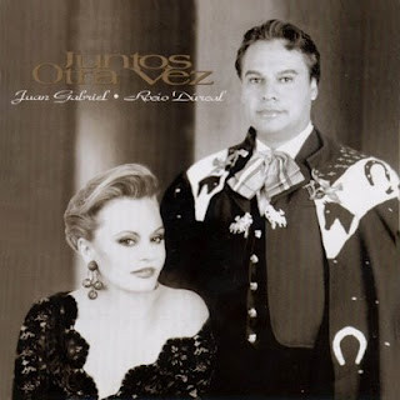The title of their album, one of the best-selling of the year (it went gold in Mexico, but double platinum in the United States — which should tell you something about the Latin-music market
Juntos Otra Vez was written and performed as a stage show — performed in a sumptuous opera house in Jalisco, the heart of the nineteenth-century son ranchera movement that Gabriel is evoking with his compositions and orchestrations — and released both as a studio album and a live video. You can see the video of "El Destino" above; its artificial staging and odd light show feel very 90s, but the music is timeless, echoing both nineteenth-century Mexican romanticism and Gabriel's old orchestrations from the 80s (those puffs of trumpets are very like the synthesized horns decorating "La Guirnalda").
The song is equally timeless, a love song — "¿me quieres?" (do you love me), she begins, and he echoes "te quiero" (I love you) — built on an epic scale, meant to soundtrack an epic romance. True to Gabriel's form, however, it's surprisingly bloodless — there's no carnality to the lyrics, no passion (though you could say that he and Dúrcal provide all that's necessary). "Soy tu amigo y tambien tu hermano" (I am your friend and also your brother), he sings at one point, as though brotherly friendship is the stuff of epic romance.
All of which perhaps makes the point that it's a true portrait of the relationship between Juan Gabriel and Rocío Dúrcal. They clearly held each other in great regard and affection — and indeed neither of them was ever as great separately as they were together — but it was a platonic, professional love. Platonic love, however, doesn't pay the pop radio bills. This song was only number one for a week, a tribute to the affection in which both singers were held by the wide Latin audience; but it also marks the end of an era. Newer, younger voices are coming up from behind.

No comments:
Post a Comment